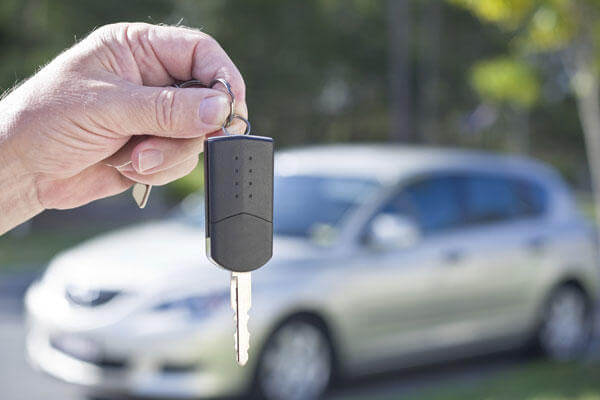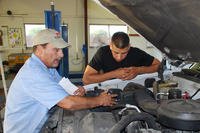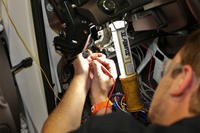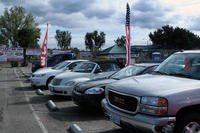If you're a service member or veteran, you will definitely want to take advantage of the many car dealership offers available this Memorial Day weekend. Edmunds.com, one of the leading online car-shopping sites, wants to ensure that potential military car-buyers go into a car shopping experience well-informed and prepared to get the best value.
What is the best strategy when shopping for car loans?
Get preapproved by a lender first, then comparison shop the loan at the dealership. It's true that new car dealerships often offer the very lowest interest rates, thanks to their relationships with the automakers' "captive" finance companies. For example, a Ford dealership will offer loans from Ford Motor Credit Company. But how do you know if the dealership has the best rate? That's why you start with preapproved financing.
In addition to banks, veterans and active-duty military can get very competitive loan rates on new and used cars from the Pentagon Federal Credit Union (PenFed). Also consider credit unions that specialize in the military branch for which you served, such as the Navy Federal Credit Union and Air Force Federal Credit Union.
After you find the car you want and reach a deal with the car salesperson, the finance manager will usually offer to beat the terms of the preapproved financing you have secured. Ask to keep all the same terms as the preapproved loan, then see if you qualify for a better rate.
If you are shopping at a used-car-only dealership that's not affiliated with an automaker, you won't be able to get those great captive-finance loans. That's makes it even more important to get preapproved by another lender. These dealerships may be making some money on the loan they offer you by marking up the interest rate they get from lenders with whom they work. It's legal, but it could cost you. By having a preapproved loan, you'll be able to compare the loan rate you'll be quoted.
Be extra cautious if you shop at "buy here, pay here" used-car dealerships. They finance buyers' purchases themselves (known as carrying their own paper). The interest rates that buy here, pay here dealerships charge are double or triple the going rate for an auto loan. If you're nervous about the terms of the loan, you can call Edmunds.com's Live Help, who can readily answer any questions you have about financing.
What should veterans consider about potential auto loans besides low interest rates?
In addition to the interest rate, veterans should consider the length of the loan. For the past decade, the average car loan term has slowly crept past five years, and is now close to five-and-a-half years. Some people have seven-year car loans.
As people try to get a more reasonable monthly payment, they sometimes extend the term of the loan. But even if you have a lower interest rate, try to avoid stretching out the loan term. The longer you finance a car, the more interest you will have to pay on it. Edmunds recommends no more than a five-year loan, less if you can manage it.
The size of the down payment is the other consideration.
Roughly what percentage of a car's value should be saved for a down payment?
Edmunds believes that 20 percent is the right number for a new car down payment and 10 percent for used cars.
As it turns out, the vast majority of people are making far smaller down payments on new cars. Our analysis of new and used car purchases showed that the average new car down payment in 2013 was just 12 percent. Nevertheless, we stand by 20 percent for new cars in particular. Here's why:
New cars begin to depreciate in value as soon as you drive off the lot. After the first year of use, new cars have an average depreciation of 20 to 25 percent. Take that depreciation, along with sales tax, finance costs and registration and pair them with a low down payment — or no down payment — and you get a buyer who is immediately "upside-down" in the car purchase. In short, the buyer owes more than the car is worth, and should you need to sell the car in a pinch you will actually have to pay money to get out of the loan -- in addition to losing the car. Lenders hate no-money down loans, and will be more likely to write the loan if there's at least a 20 percent down payment on a new car.
There are other benefits to a 20 percent down payment. It means lower monthly payments, and less money going toward finance charges. Remember, unlike money spent on home mortgages, auto loan interest is not tax deductible.
You might be wondering about those "zero down and zero APR" specials that are often advertised: Those are only available to buyers with the very best credit: as few as 10 percent of them, by one expert's estimate.
Finally, it is even more important to have the money for a new-car down payment if you have poor credit. Buyers with FICO scores of about 670 and below will have a hard time getting an auto loan from a bank or credit union unless they make at least a 15 percent down payment.
The goal is to finance a smaller amount, so the more the buyer puts down, the greater the chances of being approved.
How much should veterans budget each month when determining car loan payments?
Edmunds advises that that your monthly payment – including tax, title and registration fees – should not exceed 20 percent of your monthly after-tax income. This figure is likely to be higher than what you'll see in ads for cars, which typically do NOT include tax, title and registration fees.
Also, the figure doesn't include what you'll need to spend each month to keep that car on the road. A retired Marine lieutenant colonel, who teaches car-purchase classes at Camp Pendleton, gave us a great acronym (G.R.I.M.) to keep in mind when you're looking at the factors behind a monthly payment—beyond just the cost of the car.
G is for gas costs. Buy a fuel-efficient car to keep this in check.
R is for registration. Consider annual registration costs, which can exceed $300 for a new car.
I is for insurance. Choose your car wisely or insurance could be more than the monthly car payment.
M is for maintenance. Plan on what you'll need to set aside each month for routine service and repairs
To check out these costs for the car you're thinking about buying, we really recommend using our True Cost to Own® (TCO) calculator.
Is there any benefit to paying more than what's due each month?
Making a higher monthly payment will only save money if the payment reduces the principal. Otherwise, it is just recorded as an extra payment, allowing you to skip a payment later. If you suddenly have extra funds available, perhaps just after a tax refund, and want to pay down your loan more quickly, call your finance company and ask to speak with a loan representative. Specifically say that you want to pay down the principal to avoid interest charges. It could mean restructuring the loan, or writing two separate checks – one for the monthly payment and one to pay down the principal.
What should a veteran do when they realize they might miss a car payment?
Contact your lender immediately. Silence is not golden in this situation.
There are several ways to work out a solution, including refinancing the loan to extend the term to lower the monthly payment. And, of course, you can sell the car to pay off the loan -- assuming you are not upside-down, as described earlier.
If the situation is more than just a one-month blip and you find yourself falling further and further behind, you might have to consider a more drastic approach.
Ask the lender what you owe on the car (the payoff amount) and compare it to the car's True Market Value®. Depending on how many payments you've already made on the car, the TMV may be higher than what you owe, in which case you can sell the car to pay off the loan.
Whatever you do, don't hide from the situation. Doing that could result in a repossession of the car, and you don't want that. Repossession will severely tarnish your credit. A poor credit history and low credit score will result, making it very difficult to obtain any loan (be it a home, boat or another car) in the future.
Some people decide to give the car back to the lender. This is called a "voluntary repossession" and it also adversely affects your credit score and history. As difficult as it sounds, the best choice for car owners who are having trouble keeping up with their payments is to call the lender, be honest and ask for help.
Edmunds.com is a car-shopping website driven to make car buying easy.
Almost 18 million visitors use our shopping tools every month to connect with over 9,500 dealer franchises across the U.S. Shoppers can browse our inventory listings for available cars and trucks, and with Edmunds.com's Price Promise, they can get an instant, upfront price on those same vehicles. Recently named by Maritz Research as one of the most trusted online consumer review sites - and the only automotive site listed in the top ten - Edmunds.com is also home to comprehensive car reviews, shopping tips, photos, videos and feature stories. Even when you're at the dealership, we're always by your side. Just call our free Live Advice Line at 1-855-782-4711 or use our acclaimed Edmunds.com iPhone and iPad apps or Edmunds.com Android App. We're based in Santa Monica, Calif., but you can connect with us from anywhere by following @Edmunds on Twitter or by becoming a fan of Edmunds.com on Facebook. You can also find us on Instagram, Google+, Pinterest, LinkedIn and Flipboard.










